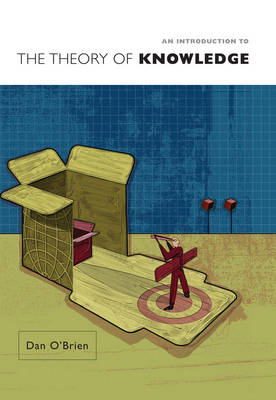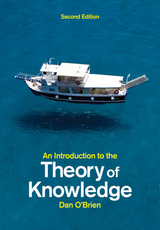
An Introduction to the Theory of Knowledge
Polity Press (Verlag)
978-0-7456-3316-9 (ISBN)
- Titel erscheint in neuer Auflage
- Artikel merken
Dan O'Brien, lectures on Philosophy at the University of Birmingham and is an Associate Lecturer for the Open University.
* Detailed Chapter Contents * PREFACE * PART I: INTRODUCTION TO KNOWLEDGE * Chapter 1: THE THEORY OF KNOWLEDGE *1. Epistemology *2. The Structure of the Book *2. 1 Part I: Introduction to Knowledge *2. 2 Part II: Sources of Knowledge *2. 3 Part III: Justification *2. 4 Part IV: Scepticism *2. 5 Part V: Areas of Knowledge *3. Further Reading and Study * Chapter 2: WHAT IS KNOWLEDGE? *1. Philosophical Analysis *2. The Tripartite Definition of Knowledge *3. Are Justification and Belief Necessary for Knowledge? *4. Gettier Cases *5. Richer Notions of Justification *5. 1 Infallibility *5. 2 No False Beliefs *6. Knowledge as Basic *7. Family Resemblance * Questions * Further Reading * PART II: SOURCES OF KNOWLEDGE * Chapter 3: A PRIORI KNOWLEDGE *1. Knowledge, Reason and Experience *2. Rationalism and Empiricism *3. The Synthetic A Priori *4. Self-Evidence and Certainty *5. Innate Knowledge * Questions * Further Reading * Chapter 4: PERCEPTION *1. Direct Realism *2. Indirect Realism *2. 1 The Argument From Illusion *2. 2 Dualism *3. Rejecting Realism *3. 1 Idealism *3. 2 Phenomenalism *3. 3 Problems for Phenomenalism *4. The Intentionalist Theory of Perception *4. 1 Adverbialism *4. 2 Intentionalism *4. 3 Phenomenology *5. Seeing That, Seeing As, and Raw Seeing * Questions * Further Reading * Chapter 5: TESTIMONY *1. The Individualistic Approach to Knowledge *2. Testimony *3. Hume's Account of Testimony *3. 1 The Problem of Circularity *3. 2 The Martian Argument *4. Reid's Account of Testimony * Questions * Further Reading * PART III: JUSTIFICATION * Chapter 6: FOUNDATIONALISM *1. The Regress Argument for Traditional Foundationalism *2. Sellars and the Myth of the Given *3. Conceptual and Non-Conceptual Content *4. Wittgenstein's Private Language Argument *5. Experience and Thought *6. Modest Foundationalism * Questions * Further Reading * Chapter 7: COHERENTISM *1. A Holistic Conception of Justification *2. The Concept of Coherence *3. Problems for Coherentism *3. 1 The Isolation Problem *3. 2 Alternative Coherent Belief Systems *4. Coherence Theories of Truth *5. A Coherentist Account of Perception *6. A Thinker's Access to Her Own Belief System * Questions * Further Reading * Chapter 8: INTERNALISM AND EXTERNALISM *1. Internalism *2. Externalism *2. 1 The Basic Reliabilist Picture *2. 2 Causal Accounts of Knowledge *2. 3 Tracking Accounts of Knowledge *3. Arguments for Externalism *3. 1 Non-Reflective Knowledge *3. 2 An Epistemological Cure-All *4. Arguments Against Externalism *4. 1 Knowledge and Rationally Motivated Action *4. 2 Lucky Yet Reliable Beliefs *5. Two Kinds of Knowledge * Questions * Further Reading * PART IV: SCEPTICISM * Chapter 9: SCEPTICISM *1. Cartesian Scepticism *1. 1 Dreams and the Demon *1. 2 Descartes Goes to the Movies *2. Accepting Cartesian Scepticism *2. 1 Withholding Belief *2. 2 Dinner, Backgammon and Conversation *3. Contextualism *4. Cognitive Externalism *5. The Epistemological Externalist Response to Scepticism * Questions * Further Reading * Chapter 10: THE PROBLEM OF INDUCTION *1. Inductive Inference *2. Hume's Inductive Scepticism *3. Responses to Inductive Scepticism *3. 1 Popper's Deductive Conception of Science *3. 2 Probability *3. 3 The Reliabilist Response *3. 4 The Coherentist Response *4. The New Riddle of Induction *5. Responses to the New Riddle of Induction *5. 1 Simplicity *5. 2 Grue is Not a Colour * Questions * Further Reading * Chapter 11: NATURALIZED EPISTEMOLOGY *1. Quine and Epistemology *1. 1 The Failure of Traditional Epistemology *1. 2 Quine and Scepticism *1. 3 Quine and the A Priori *2. The Normative Nature of Epistemology *3. Less Radical Forms of Naturalism * Questions * Further Reading * PART V: AREAS OF KNOWLEDGE * Chapter 12: MEMORY *1. Memory, Belief and Knowledge *2. Memory Images *3. The Causal Theory of Memory *4. Scepticism and the Reality of the Past *5. The Relation Between Perception, Testimony and Memory * Questions * Further Reading * Chapter 13: OTHER MINDS *1. First Person Authority *2. The Problem of Other Minds and Solipsism *3. The Argument From Analogy *4. Seeing Minds *5. The Private Language Argument Revisited *6. Behaviourism *7. Theoretical Knowledge of the Mind * Questions * Further Reading * Chapter 14: MORAL KNOWLEDGE *1. An Empirical Approach to Morality *1. 1 Utilitarianism *1. 2 Problems for Utilitarianism *2. An A Priori Approach to Morality *2. 1 Kant and the Categorical Imperative *2. 2 Problems for Kant's Moral Theory *3. Moral Testimony *4. Moral Scepticism *4. 1 Relativism *4. 2 Emotivism * Questions * Further Reading * Chapter 15: GOD *1. An A Priori Proof for the Existence of God: The Ontological Argument *2. Empirical Justification for Religious Belief *2. 1 The Argument From Design *2. 2 The Argument From Miracles *2. 3 Hume on Miracles *3. Perceiving God *4. Pascal's Wager *5. Scepticism, Atheism and Agnosticism * Questions * Further Reading * Glossary * References * Index
| Erscheint lt. Verlag | 5.10.2006 |
|---|---|
| Zusatzinfo | 4 illustrations |
| Verlagsort | Oxford |
| Sprache | englisch |
| Maße | 178 x 253 mm |
| Gewicht | 540 g |
| Themenwelt | Geisteswissenschaften ► Philosophie ► Erkenntnistheorie / Wissenschaftstheorie |
| ISBN-10 | 0-7456-3316-1 / 0745633161 |
| ISBN-13 | 978-0-7456-3316-9 / 9780745633169 |
| Zustand | Neuware |
| Haben Sie eine Frage zum Produkt? |
aus dem Bereich


![Was heißt Denken?. Vorlesung Wintersemester 1951/52. [Was bedeutet das alles?] - Martin Heidegger](/media/113619842)
